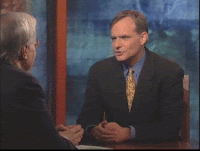
It's easy for the current economic issues to become a blur. Economist James Galbraith recently brought some order to the issues by highlighting the distinction between the
economic stimulus legislative package and the
financial system bailout package. During a recent interview on DemocracyNow! with Amy Goodman Galbraith explained they are distinct, but mutually supporting pieces of the economic puzzle.
AMY GOODMAN: Professor Galbraith, do you think the stimulus package is large enough?
JAMES GALBRAITH: The stimulus package is a very good bill, and it should pass. It will not, by itself, deal with the economic crisis that we’re in. I think we should be very clear about that... A major problem that we face is that the stimulus package is sized so that it will work only if the revival of credit, which is part of the plan that the Treasury is announcing today (2/10/09), also works.... I think it’s very important to understand that this spending package is really geared to the success of this other piece, and this other piece is much more problematic than the spending package is.
Treasury Secretary Timothy F. Geithner is taking the lead on the second piece, propping up the financial institutions and getting the main street credit system working. This second piece, in theory, addresses freeing up the loans necessary for small businesses to have liquid cash to buy inputs to their products, to make payroll, for students to get loans, for creditworthy people to get car loans all of which are part of making the economic engine run.
Geithner's press event last Tuesday on the plan to stabilize the financial system was blasted as being too vague... Team Obamaa probably should have saved Geithner's announcement for
after last weekend's G7 meeting in Rome, because Geithner was unable to provide details before he worked out some international details.
The financial system problem in a nutshell: Most, if not all, of the dozen or so biggest banks have bad debt on their books, probably making some of the banks insolvent. The banks won't make loans to each other, because they don't trust each other to pay back the loans. So what does Geithner's plan offer as general approaches?
In one case, government guarantees would be provided to protect a bank from future losses caused by the toxic assets. In another case, the government would buy the assets outright from a bank. [2]
Either way, "government" = "tax payer."
As expanded on in the upcoming
Episode 6 of the GDAE Podcast, the bottom line is that government accountants must have access to the bank's books. That's happening to some degree already, but needs to be done in a comprehensive and systematic way... sooner than later. It's also best to have international coordination when examining the books, because a lot of bad news is hiding on those books and the negative fallout has international implications:
This need for coordination is more than just rhetoric, officials said. If the United States develops a method to examine the books of banks and evaluate the real worth of their assets, it would likely affect financial firms around the world. Other countries would have to consider similar actions.[2]
We all need to raise our voices and urge Team Obama to direct sufficient resources to the FDIC to send their examiners into the banks to look a the books. The longer they delay, the more we pay.
Psssst... Do SomethingSources:1. DemocracyNow!,
Economist James Galbraith: Bailed-Out Banks Should Be Declared Insolvent, February 10, 2009.
2. Washington Post, Geithner Takes Plan To Global Leaders
Secretary Reassures Counterparts About U.S. Rescue Strategy, February 15, 2009.

 We don't usually turn our attention to that small number of very wealthy Americans who constitute our modern-day aristocracy... probably because we've been beaten down by admonishments for threatening class warefare. Well, the war is on.
We don't usually turn our attention to that small number of very wealthy Americans who constitute our modern-day aristocracy... probably because we've been beaten down by admonishments for threatening class warefare. Well, the war is on.





















